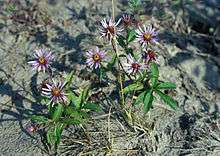Eurybia sibirica
| Siberian aster | |
|---|---|
 | |
| Eurybia sibrica in Yukon | |
| Scientific classification | |
| Kingdom: | Plantae |
| (unranked): | Angiosperms |
| (unranked): | Eudicots |
| (unranked): | Asterids |
| Order: | Asterales |
| Family: | Asteraceae |
| Tribe: | Astereae |
| Genus: | Eurybia |
| Species: | E. sibirica |
| Binomial name | |
| Eurybia sibirica (L.) G.L.Nesom | |
| Synonyms[2] | |
|
Synonymy
| |
Eurybia sibirica, commonly known as the Siberian aster or arctic aster, is an herbaceous perennial native to north western North America and northern Eurasia. It is found largely in open areas of subarctic boreal forests, though it is also found in a wide variety of habitats in the region. It is similar in appearance to Eurybia merita, but their ranges overlap only near the border between the US and Canada, where E. sibirica is generally found at higher elevations.
Eurybia sibirica is a perennial herb up to 60 cm (2 feet) tall, spreading by means of thin underground rhizomes. The plant produces flower heads either one at a time or in dense flat-topped arrays of 2-50 heads. Each head contains 12-50 white, purple, or pale violet ray florets surrounding 25-125 yellow disc florets.[3]
Distribution and habitat
Eurybia sibirica is present in much of the subarctic region of world, in northwestern North America and Northern Europe and Northern Asia. It is common in northern Asia (Buryatia, Yakutia, Mongolia, Japan, Chinese Province of Heilongjiang and other parts of North of China).[3] It is also found in European Russia and Scandinavia , as well as northern and western Canada (Alberta, British Columbia, and all 3 Arctic provinces) and United States (Alaska plus the mountains of Washington, Idaho, and Montana).[4] It is found at heights ranging from sea level up to 2200 metres in sandy or gravely soils in disturbed or open areas of boreal forests. It is also present in wet meadows, in open areas of aspen and spruce woods and along riparian thickets. In addition, it is common growing in sandy or gravelly stream flats, along stream banks and the shores of lakes, on bluffs, in sand dunes and other sandy places, and in both sub-alpine and mountain meadows.[5]
- Subspecies[2]
- Eurybia sibirica subsp. sibirica
- Eurybia sibirica subsp. subintegerrima (Trautv.) Greuter
References
- ↑ "Eurybia sibirica". NatureServe Explorer. NatureServe. Retrieved 2007-06-14.
- 1 2 The Plant List, Eurybia sibirica (L.) G.L.Nesom
- 1 2 Flora of China, Eurybia sibirica (Linnaeus) G. L. Nesom, Phytologia. 77: 261. 1995. 西伯利亚紫菀 xi bo li ya zi wan
- ↑ Tutin, T.G.; V. H. Heywood; N. A. Burges; D. H. Valentine; S. M. Walters; D. A. Webb (eds.), "Aster sibiricus", Flora Europaea, Cambridge University Press
- ↑ Brouillet, Luc (2006), "Eurybia sibirica", in Flora of North America Editorial Committee, eds. 1993+, Flora of North America, 20, New York & Oxford: Oxford University Press, p. 370
External links
- Alaskan Wildflowers photos
- Paul Slichter, The Sunflower Family in Denali National Park and Preserve. Arctic Aster, Siberian Aster Eurybia sibirica photos
- Czech Botany, Eurybia sibirica (L.) G. L. Nesom – Siberian Aster, Arctic Aster in Czech with photos
- Plantarium, Aster sibiricus L. with photos
- Korgplantefamilien, Sibirstjerne - Eurybia sibirica photos, captions in Swedish
